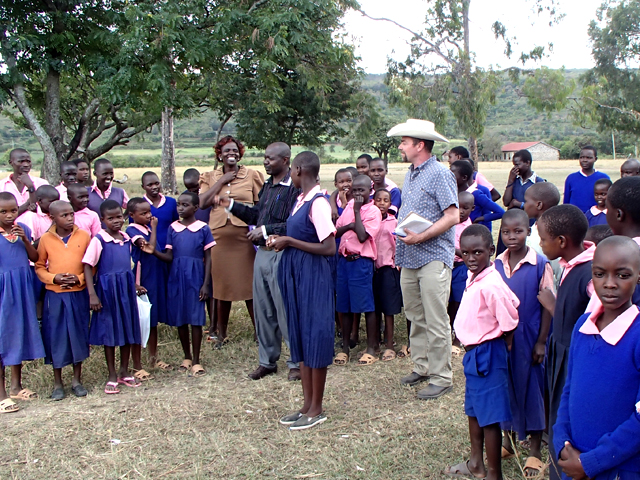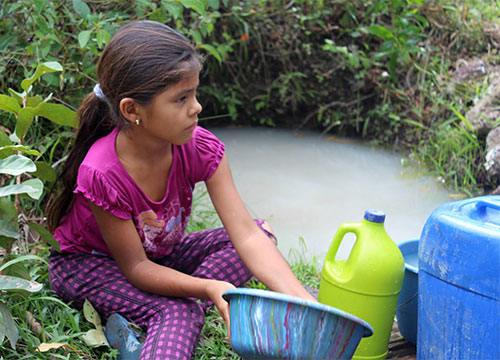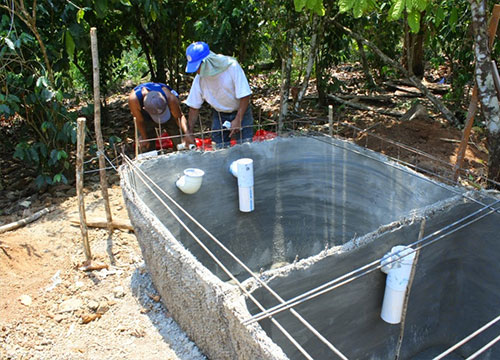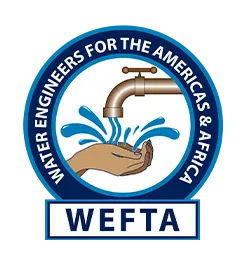Kenya
WEFTA helps facilitate access to reliable water, sanitation and hygiene facilities in Kenyan homes, schools, and healthcare facilities.
“The need for safe available water is extreme in Kenya, and there is a serious shortage of adequate latrines especially at schools and dispensaries.” – Mark Reimers, Waterlines Volunteer
In Kenya, most rural homes and schools depend on streams, unprotected springs, and open ponds for water. As in many developing countries, the women and children bear the responsibility of collecting water for their families, spending several hours daily carrying water – and the water they collect is contaminated. The most common method to purify the water is by boiling, which then requires additional time for wood collection. This means more time away from a classroom for students.
WEFTA helps find solutions for access to safe reliable water, enabling these children to receive an education rather than spending time carrying water. WEFTA helps empower communities for healthier, sustainable, and brighter futures.
WASH in Schools
Instrumental in the founding of WEFTA, our sister organization, Waterlines, has worked in the Bomet County located in the Southern Rift Valley of Kenya since the late 1990s. Waterlines volunteers in collaboration with Peace Corps volunteers have worked closely with local schools on spring protection and rainwater harvesting programs. Local counterparts and partners help facilitate program objectives and carry out the projects. These projects include over 25% community match in materials and in-kind labor.
In 2008, in cooperation with Tenwek Community Health and Development, Waterlines initiated a pilot effort at selected schools in the region to provide a complete program of water, sanitation, and hygiene (WASH) education. This program included a rainwater-harvesting system, water purification, latrines, hygiene curriculum, and hand washing stations. Currently 62 schools participate in this program.
WASH in Healthcare Facilities
Forty-nine percent of healthcare facilities in sub-Saharan Africa lack basic water services.
Since 2012, Waterlines’ counterparts in Bomet County have worked with staff at 15 health dispensaries to construct rainwater harvesting tanks, gutters, and handwashing stations along with improved latrines designated for use by women or men.
WEFTA continues its commitment to support WASH projects in schools and healthcare facilities in Kenya. Our engineers provide technical support for well drilling, waterline installation, water tank construction, rooftop rain catchment systems, and sanitation projects. To maintain sustainability, our volunteers conduct post-construction follow-up for all completed WEFTA projects.
Every time we send a crew on a trip to either help or assess a community, we ask our volunteers to write a Trip Report that details the trip through their eyes. These reports provide not only a first-hand perspective on our efforts to help communities, but also a glimpse of what it is like to be a WEFTA volunteer.
Sources:
Capital: Nairobi
Area: 580,367 sq. km.
Population: 53,527,936 (July 2020)
Languages: English (official), Kiswahili (official), numerous indigenous languages
Regions: Kenya is located in eastern Africa, bordering the Indian Ocean, between Somalia and Tanzania. The low coastal plain rises westward from the India Ocean to the central highlands bisected by the Great Rift Valley. The Kenyan Highlands comprise one of the most successful agricultural production regions in Africa and include Mount Kenya, Africa’s second highest peak. Lake Victoria makes up the western border.


Water & Health
Since 2002, WEFTA has been connecting donors, engineers, and communities in Latin America and Africa, all with the common goal of ensuring access to clean drinking water for everyone.

Sanitation & Environment
WEFTA engineers help facilitate community dialog leading to solutions for inadequate sewage treatment, and its environmental impacts.

Development & Sustainability
WEFTA volunteers work with the communities we partner with to develop the local skills needed to maintain and manage the water and wastewater systems constructed.

